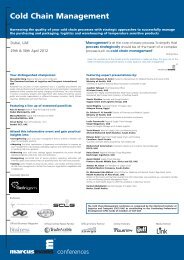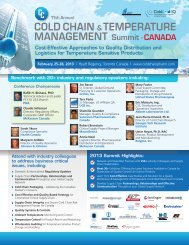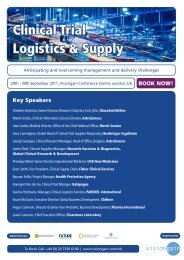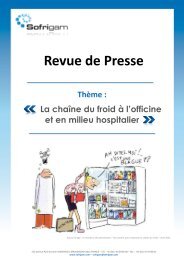Cool Chain Brochure 2013.pdf - Sofrigam
Cool Chain Brochure 2013.pdf - Sofrigam
Cool Chain Brochure 2013.pdf - Sofrigam
You also want an ePaper? Increase the reach of your titles
YUMPU automatically turns print PDFs into web optimized ePapers that Google loves.
pRe-CONfeReNCe WORkshOp Day<br />
mondAy 28tH JAnuAry 2013<br />
Workshop A<br />
Dr. Mary Foster,<br />
Chair, Packaging and<br />
Storage Expert<br />
Committee,<br />
US Pharmacopeia<br />
Workshop B<br />
Andrea Graf-Gruber,<br />
Manager, Cargo Business<br />
Process and Standards,<br />
International Air<br />
Transport Association<br />
(IATA)<br />
Workshop C<br />
Richard Peck,<br />
Senior Program Manager<br />
Life Sciences, EMEA<br />
Professional Services,<br />
Sensitech EMEA B.V.<br />
Paul DellaVilla,<br />
Project Manager Life<br />
Sciences, Professional<br />
Services,<br />
Sensitech EMEA B.V.<br />
Workshop D<br />
Simon White,<br />
Director Quality<br />
Operations, Global<br />
Logistics & Supply,<br />
EMEA Region, Pfizer<br />
9.00 –<br />
12.00<br />
an update of usP general Chapter good Distribution Practices—supply<br />
<strong>Chain</strong> integrity and industry Comments<br />
A new general USP Chapter Good Distribution Practices - Supply <strong>Chain</strong> Integrity has been presented in the new issue of the USP<br />
Pharmacopeia Forum (volume 38, edition 2).<br />
Attend this workshop to talk through the important chapters of regulations, with a specific focus on supply chain integrity. The objective of the new<br />
chapter is to ensure product identity, strength, quality, purity, and safety remains intact throughout the supply chain.<br />
The main issue of the new chapter focuses on counterfeited medicines. Here are the topics which are dealt with in detail:<br />
Legal definition of counterfeit medicines (laid down in an EU Directive for Europe, in FDCA, 21 USC 321 § 201 for the USA, inexistent in some countries),<br />
• Types of counterfeit medicines<br />
• Medical consequences of counterfeit medicines<br />
• Distribution (e.g. also via internet)<br />
• How to prepare your organisation for changes to chapter <br />
A paragraph entitled “Best Practices to combat Counterfeit Drugs and Medical Devices” presents a range of measures and possibilities to combat<br />
counterfeit medicines – this workshop will give you an overview of these strategies and how you can implement them.<br />
Some of these measures include;<br />
• Packaging technologies (secured packaging, authentication and serialisation technologies, etc.)<br />
• Establishment of Pedigrees / e-Pedigrees<br />
• Use of 2D bar codes (ECC 200) or RFID tags<br />
9.00 –<br />
12.00<br />
Practical approaches for implementing iata regulations for time & temperature<br />
sensitive air Freight shipments<br />
IATA has been collaborating with supply chain stakeholders to understand and define high-standard requirements for time and temperature<br />
sensitive air freight shipments.<br />
This workshop will examine practical approaches to sensitive healthcare products transport and how to comply with the Perishable Cargo<br />
Regulations (PCR) Chapter 17, including IATA labels. The workshop will assess the current challenges in perishable air freight and discuss how<br />
these challenges are addressed in the regulation to ensure communication, processes and standards are in place to maintain the integrity and<br />
quality of the time and temperature sensitive products along the PCR supply chain.<br />
The workshop will discuss:<br />
• What is the feedback of the industry on the implementation of the IATA Time and Temperature label?<br />
• Is the industry ready to implement end to end standard processes?<br />
• The IATA’s Road Map for 2013<br />
12.30 –<br />
15.30<br />
the use of time and temperature generated Data to Create Meaningful KPis,<br />
Enabling a greater understanding of the supply <strong>Chain</strong>, Helping to safeguard<br />
Product integrity<br />
Time and temperature data related to the distribution of temperature-sensitive medicinal products is an important element of a company’s quality<br />
initiatives. Throughout the supply chain, there are many unforeseen and uncontrollable factors that can cause products to be exposed to temperatures<br />
outside of their acceptable range for storage and distribution. These variations, if not managed carefully, may result in expensive and time-consuming<br />
quarantine processes, product loss, or at worst, harm to the end user.<br />
Utilising a comprehensive data storage management tool capable of generating reports linked to Key Performance Indicators (KPIs), enables<br />
managers to review the current state of the supply chain, assessing various risks, whilst delivering critical notifications to managers in quality,<br />
logistics, distribution, warehousing, etc… These reports allow for the implementation of fast and effective preventative measures thus minimizing<br />
risks in the supply chain.<br />
The workshop will focus on two objectives:<br />
1) Look at industry best practices and the pitfalls of data collection and report generation, then;<br />
2) Outline the methods used to set up appropriate data collection processes enabling the development of meaningful KPIs, demonstrating how<br />
certain KPIs can be used to support continuous process improvement.<br />
12.30 –<br />
15.30<br />
Keeping up with the EMa: Controlled room temperature requirements<br />
This session will lead you through the top 3 anticipated challenges relating to the GDP updates. Simon is actively involved in tracking feedback for<br />
the GDP developments and will address each individually before assigning a crisis case study to you in groups. The challenges;<br />
1.Distribution under controlled room temperature<br />
Controlled room temperature implies a certain degree of control over the temperature of the storage conditions and a continuous temperature<br />
monitoring system is required for the storage of medicinal products.<br />
2.Segregation of product<br />
Many Distribution Centres export globally, what is the purpose and benefit of segregating EU product from non-EU product? What is considered<br />
a definition of ‘segregation’ (physical, electronic, both...)? All finished product batches can be considered segregated since they are – as A GMP<br />
requirement - packaged, identified and managed in such as a way to avoid cross-contamination with other product, whether for use in humans or<br />
animals and irrespective of the indication for use.<br />
3.Intermediaries<br />
What is the industry’s oversight protocol for Intermediaries in the distribution process, carriers, freight forwarders etc.? What is the most effective<br />
quality oversight method for service providers, expectations, who should be responsible...?<br />
Your Task;<br />
You will be presented with a real life case study and must work through possible solutions in your group. Each group will then feedback to the whole<br />
workshop and you will walk away with brand new strategies!<br />
RegisteR NOW<br />
phONe: +44 (0) 20 7368 9300 email: enquire@iqpc.co.uk WeB: www.cooLcHAineurope.com






